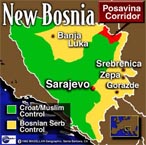Bosnian foes fight again - over new census
 Sarajevo - Bosnia is the only European country that does not know how many inhabitants it has - and plans to finally hold an oft- delayed census in 2011 are being blocked by the same ethnic tensions which led to war in the 1990s.
Sarajevo - Bosnia is the only European country that does not know how many inhabitants it has - and plans to finally hold an oft- delayed census in 2011 are being blocked by the same ethnic tensions which led to war in the 1990s.
It is nearly 20 years since Bosnia last conducted a census, in 1991, before the conflict which killed tens of thousands, and displaced hundreds of thousands of people.
The next census grew into a hot political issue, with ethnic communities fighting again, this time over the content of the questionnaire.
The 1992-95 war pitted Serbs, backed by Belgrade, against the uneasy alliance of Muslim Bosniaks and Croats. In the 19991 census, 43.5 per cent of the 4.1 million citizens were Bosniaks, 31.2 per cent Orthodox Serbs and 17.4 per cent Catholic Croats.
Now Serbs and Croats want the census to include mandatory questions on ethnic and religious background, which Bosniak leaders vehemently oppose - warning that it would cement the effects of wartime ethnic cleansing.
"Bosniak politicians are trying to prevent the loss of influence in the Serb Republic, insisting that it would legalize the consequences of ethnic cleansing," political analyst Srecko Latal told German Press Agency dpa.
The war ended in 1995 through a US-brokered peace deal which partitioned Bosnia into the Serb Republic and the Federation Bosnia-Herzegovina of Bosniaks and Croats. The entities are near-sovereign, but remain under the umbrella of the Bosnian state.
The Dayton peace agreement, which also serves as the de facto constitution, allocates administrative posts on all levels of the government, including the entities, reflecting the ethnic make-up.
But the basis for government post allocation was the count from 1991 census - before the war and before all ethnic rivals did their utmost to drive the others out of their domains, with mostly Muslims at the receiving end.
If a new census is based on the questionnaire as Serbs and Croats want it, it would deprive Muslims of many government posts in the Serb Republic, further hampering the already slow return of refugees.
The effect would be similar for all three groups and all over Bosnia, but the Muslims in the Serb part would lose the most.
"Either that, or the entire governing mechanism in Bosnia must be changed because of the dramatic change of ethnic structure in relation to what it was before the war," Latal said.
But the prospect of any major change in Bosnia is always difficult and murky, amid persistent tensions and mistrust.
The joint Bosnian cabinet last month passed the draft census law, after Serb and Croat ministers outvoted their Bosniak colleagues, and the bill is scheduled to enter the lower legislative chamber on September 16.
Which does not mean it will be passed in near future, because the Dayton agreement had also built safeguards against outvoting into the complex legislative system, giving each of the three ethnic communities an effective power of veto in the chamber.
"The council of ministers (Bosnian government) passed the draft law by outvoting Bosnian ministers," Amir Zukic, the secretary general of the main Muslim party, the SDA, told dpa.
"Now we'll try to amend it in parliament, to change the contested provisions on ethnic and religious background," he said. "When this law can be adopted, we still cannot tell." (dpa)